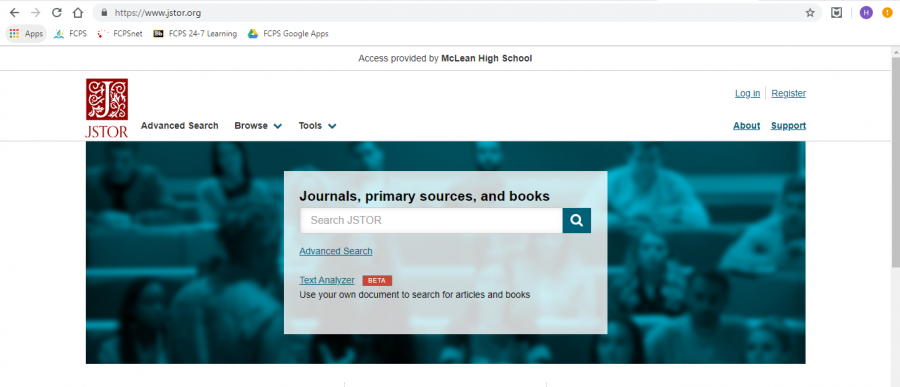A sad year for the library resource database
Top resource will not be returning to McLean for the 2019-20 school year
This is the homepage of JSTOR’s expansive network of sources. We do not need to log in or make an account since the school gives us access. Photo taken from https://jstor.org
September 16, 2019
This year, McLean students taking research-heavy classes may find themselves at a disadvantage in comparison to previous years. One of the most crucial resources for scholarly research, JSTOR, is no longer owned by McLean High School or Fairfax County Public Schools.
Fairfax County as well as McLean High School specifically purchase or subscribe to academic resources in order to help students. An example would be NoodleTools or VLeBooks, as they were bought by Fairfax County for all its public schools. JSTOR was unique in the sense that McLean High individually subscribed to it.
“For the last 10 years, we were given permission to subscribe to [JSTOR] as independent high schools, so not all high schools had it,” head librarian Joan McCarthy said.
This year, however, there were prospects of FCPS buying JSTOR for the entire county, like the previously mentioned NoodleTools. Unfortunately, these hopes never came to fruition.
“I don’t know the background of why the negotiations failed, but at least for this year, we have lost JSTOR. It is not available, even to the schools that had subscribed to it independently,” McCarthy said.
McLean’s library resource database is a large collective, so in theory this loss shouldn’t be crippling to the ability of the average McLean student to seek complex research. JSTOR is slightly different from the other sources; the caliber of the sources is higher in the sense that resources found on there have a very deep scope.
“Because [the sources offered by JSTOR] are peer reviewed, these are academic journals of high level reading and content. It shows the students where the current research is and where it’s going,” McCarthy said.
For many classes like AP Capstone and AP Research, sophisticated online sources or scholarly journals are key to success. Simply using Google to find information for a research paper, project, or presentation is arbitrarily useful and would not meet the standards that class.
“When we say ‘peer-reviewed,’ [it means it’s] checked, verified with peers of the same academic level. Our students use it for in-depth research,” McCarthy said.



